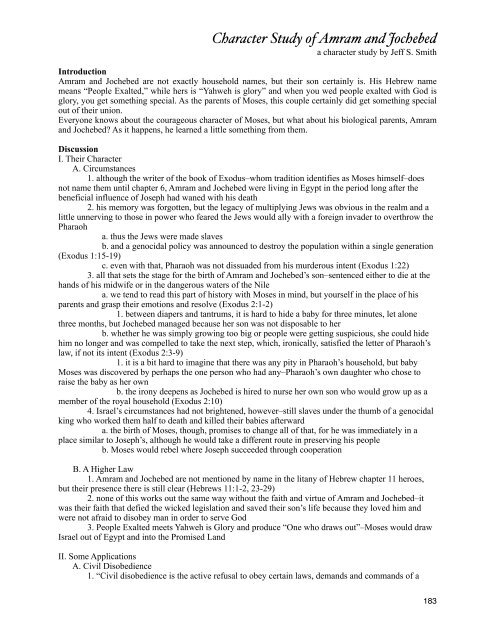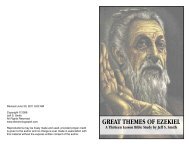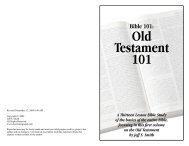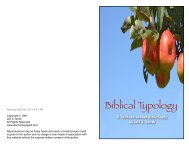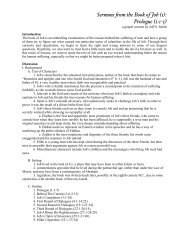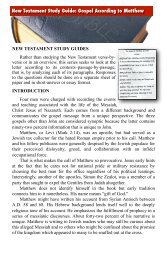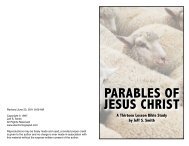Character Studies - ElectronicGospel
Character Studies - ElectronicGospel
Character Studies - ElectronicGospel
- No tags were found...
Create successful ePaper yourself
Turn your PDF publications into a flip-book with our unique Google optimized e-Paper software.
<strong>Character</strong> Study of Amram and Jochebeda character study by Jeff S. SmithIntroductionAmram and Jochebed are not exactly household names, but their son certainly is. His Hebrew namemeans “People Exalted,” while hers is “Yahweh is glory” and when you wed people exalted with God isglory, you get something special. As the parents of Moses, this couple certainly did get something specialout of their union.Everyone knows about the courageous character of Moses, but what about his biological parents, Amramand Jochebed? As it happens, he learned a little something from them.DiscussionI. Their <strong>Character</strong>A. Circumstances1. although the writer of the book of Exodus–whom tradition identifies as Moses himself–doesnot name them until chapter 6, Amram and Jochebed were living in Egypt in the period long after thebeneficial influence of Joseph had waned with his death2. his memory was forgotten, but the legacy of multiplying Jews was obvious in the realm and alittle unnerving to those in power who feared the Jews would ally with a foreign invader to overthrow thePharaoha. thus the Jews were made slavesb. and a genocidal policy was announced to destroy the population within a single generation(Exodus 1:15-19)c. even with that, Pharaoh was not dissuaded from his murderous intent (Exodus 1:22)3. all that sets the stage for the birth of Amram and Jochebed’s son–sentenced either to die at thehands of his midwife or in the dangerous waters of the Nilea. we tend to read this part of history with Moses in mind, but yourself in the place of hisparents and grasp their emotions and resolve (Exodus 2:1-2)1. between diapers and tantrums, it is hard to hide a baby for three minutes, let alonethree months, but Jochebed managed because her son was not disposable to herb. whether he was simply growing too big or people were getting suspicious, she could hidehim no longer and was compelled to take the next step, which, ironically, satisfied the letter of Pharaoh’slaw, if not its intent (Exodus 2:3-9)1. it is a bit hard to imagine that there was any pity in Pharaoh’s household, but babyMoses was discovered by perhaps the one person who had any–Pharaoh’s own daughter who chose toraise the baby as her ownb. the irony deepens as Jochebed is hired to nurse her own son who would grow up as amember of the royal household (Exodus 2:10)4. Israel’s circumstances had not brightened, however–still slaves under the thumb of a genocidalking who worked them half to death and killed their babies afterwarda. the birth of Moses, though, promises to change all of that, for he was immediately in aplace similar to Joseph’s, although he would take a different route in preserving his peopleb. Moses would rebel where Joseph succeeded through cooperationB. A Higher Law1. Amram and Jochebed are not mentioned by name in the litany of Hebrew chapter 11 heroes,but their presence there is still clear (Hebrews 11:1-2, 23-29)2. none of this works out the same way without the faith and virtue of Amram and Jochebed–itwas their faith that defied the wicked legislation and saved their son’s life because they loved him andwere not afraid to disobey man in order to serve God3. People Exalted meets Yahweh is Glory and produce “One who draws out”–Moses would drawIsrael out of Egypt and into the Promised LandII. Some ApplicationsA. Civil Disobedience1. “Civil disobedience is the active refusal to obey certain laws, demands and commands of a183


